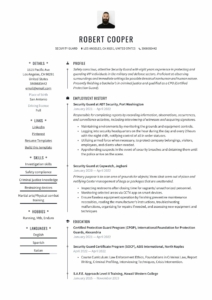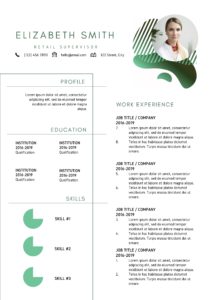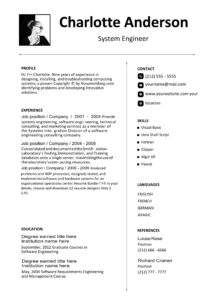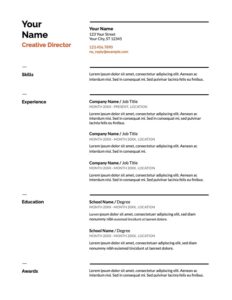When you are seeking a job as a Security Guard, you may find that writing or improving your resume is a bit frustrating with the information overload available on Google.
Our Security Guard resume sample below will provide you with answers to the “how-to” questions you may have regarding resume compilation. Which sections to use?, What work experience to include?, How to write a resume summary for a Security Officer job? And How to list accomplishments on a Security Officer resume? Will be some of the tricky questions answered and explained in the write-up below.
We have also packed this resume guide with plenty of examples and tips to help you represent your skills and experience in the best possible manner and increase your chances of being hired exponentially.
What you can read in this article
Security Guard Resume Examples
(Free resume sample downloads are at the bottom of this page in pdf)
Security Guard Resume Writing Guide
Resume Sections:
- Contact information
- Profile Summary
- Employment History
- Accomplishments
- Education
- Skill Section
- Certification & Licensing
- Extras: Languages/Awards/Publications/Volunteering/hobbies
- > Professional information
What to Highlight in a Security Resume
Security Guards are responsible for keeping company property, assets, and environments safe and crime-free. This is the purpose of the job in a nutshell. To grab a recruiter’s attention; however, there are certain aspects of your job and technical competencies that need to shine through in your resume document.
Firstly, explain the type of setting you are working in. You may be stationed in a secured estate monitoring and protecting individual properties or working for a corporate company watching over a high-rise headquarters building or located at a plant or manufacturing facility. The more specialized guard may also be employed by federal, state, and government agencies to protect key individuals in high-level positions. Alternatively, you may offer services to celebrities and VIPs, aka being a personal bodyguard.
Secondly, you need to highlight the scope of your role, which refers to what your purpose of employment is. For instance, you could be in a passive protection role where you are tasked with watching CCTV cameras all day long, identifying threats, intruders, or situations that may pose a risk to property or human lives. In other cases, your role could be more active where scanning, scrutinizing and monitoring takes place by walking around the premises or guarding key areas and spaces and ensuring the safety of those within the company environment
The next aspect to elaborate on is your responsibility, and the protocols followed when an incident or accident occurs. For instance, the steps you follow when an alarm is triggered, do you merely notify or are you tasked with immediately investigating the reason for the alarm going off? Some Security Offers are tasked with reporting the incident to a third party like the police and notifying another security official who would then act to resolve the situation, apprehend the perpetrator or secure the area where an accident has taken place. In another case, you may be responsible for documenting proceedings, taking statements from parties involved, and submitting reports to the relevant superior.
You may also want to mention specific KPIs that you need to adhere to, for instance, checking windows, gates, and doors after the workday is finished to ensure all is properly locked and secured. Security Officers al need to keep logs during their shifts and prepare reports regarding minor and major incidents.
Don’t forget to showcase your personal and communication skills when you are tasked with submitting warnings when someone is trespassing or loitering, even reprimanding employees and staff when certain rules are broken, explaining to them what the consequences of their actions are in a firm but polite manner. Handling conflict is a vital skill for any Security Officer. Think about the irate executive who forgot his access card and now needs to complete a lengthy form to gain access to the building’s parking area
Shiftwork is standard in a Security guard’s work setting. It would help if you clarified the length of your shifts, whether you have worked night shifts or used to working during weekends and holiday periods.
Finally, you may have more responsibility than the standard Security guards because you are in a supervisory capacity leading a team of Security guards, giving orders to or manage a group of Security Guards, and overseeing their daily operations.
Resume Hack: Add a few bells and whistles
Take your resume to the next level by adding three wow factors in a separate section. These are different from accomplishment statements as you will focus on ACTIONS, RESULTS, and BENEFITS without quantification (more on quantification later). What has been your proudest moment? Where did your actions make an impressionable impact or helped someone in a profoundly positive way?
For example:
- Tweaked the procedure to detect unauthorized access to the newborn ward by installing extra security cameras (this is the ACTION part).
- As a result, levels of security were automatically raised as visitors going in and out of the baby ward were closely monitored (this is the RESULT).
- Prevented a baby from being abducted by making alarm when a visitor was seen on camera leaving the ward, with a suspicious-looking box he did not have on his person when entering the ward (this is the BENEFIT/VALUE).
1. Contact information
- First & Last Name
- Physical Address
- Driver’s license (optional)
2. Security Guard Resume Objective
A career summary could be the first and regrettably also the last paragraph a Security Manager reviews if not written properly with enough ‘’spunk’’ as well as credibility to grab instant attention and prompt the reader to want to see the rest of your resume. Adding spunk is fairly easy if you follow this four-step process.
- Step 1 – Start with a powerful adjective describing your demeanor
- Step 2 – Mention years of experience and industry setting
- Step 3 – Add one or two noteworthy competencies
- Step 4 – Finish off with highest credential, accreditation or qualification
Example Objectives:
Resume Objective 1
“Safety conscious, observant Security Guard with seven years of experience in guarding and protecting key individuals in the defense and military sectors. Adept at scanning surroundings and immediate environments for potential threats and risks of human and nonhuman nature. Currently completing a Bachelor's in Criminal Justice and accredited as a CPO (Certified Protection Officer).”
Resume Objective 2
“Vigilant and agile Security Officer with five years’ experience safeguarding assets such as equipment and machinery in remote mining locations. Expert at identifying suspicious activities and prevent illegal actions, criminal behavior, and physical breaching of electric fences around the premises. Physically fit and dexterous with a prestigious ASIS accreditation completed recently.”
Resume Objective 3
“Proactive and responsible Security Officer with eight years of experience in controlling and monitoring access at nuclear facilities and chemical plants in the Mid-West. Competent using the latest digital security applications to detect unauthorized access at multiple entrances and exit locations on the premises. Recently attained Certified Protection Professional status.”
Security Guard Job Descriptions, Responsibilities and Duties
An employer would expect to see the specific, proven security and protection duties in your resume. Herewith a few examples of primary Security Officer duties in various industrial environments.
Examples
A Security Officer at a Shopping Centre/Mall may:
- Provide physical security, access control and emergency response to customers and employees
- Patrol parking lots on upper and underground levels and report suspicious activities to Center Management
- Monitor incoming and outgoing vehicles and do spot searches inside the vehicles
- Scan area premises for objects and items seemingly out of place and notify Center management of unattended bags or packages
- Inspect restrooms after hours for vagrants or unauthorized entrants
- Monitor designated areas via CCTV app on smart devices and tablets
- Report safety concerns or peculiar circumstances to the Head of Security
- Log events and incidents as per employer protocols
- Handle emergencies and security issues following predetermined rules of conduct set out in the safety and security manuals
An Armed Security Officer at an Industrial Facility may:
- Perform identification checks and vehicle searches on all clients and employees entering the facility
- Safeguard employees, clients, and visitors with proper vetting techniques
- Provide directions and assistance to visitors and notify front desk reception that they are on their way
- Respond to emergencies involving buildings or people adhering to safety procedure conduct of the company
- Conduct regular foot patrols around the premises at night checking for open windows, unlocked doors, and unauthorized activities
- Log into security headquarters hourly during the day and every two hours during the night notifying them of all in order status
- Used armed force when needed to protect company assets, employees, visitors and clients when required
- Apprehend suspects in the case of security breaches and detain them until police arrive
A Security Officer at a Hospital/Medical Institution may:
- Provide security services to staff, patients and visitors ensuring the safety of individuals and hospital assets
- Diligently scan designated areas for unauthorized access such as medical equipment and drug storerooms
- Relieve at the front desk at night times checking identification and signing visitors in and out
- Conduct hourly foot patrols inside the hospital, checking corridors, restrooms, and wards for suspicious activities or unattended items
- Initiate emergency or security protocols when rule violations, safety breaches or incidents such as fires or bomb threats occur
- Ensure that visitors, patients, and employees comply with safety and security regulations at all times and issue warnings when needed
- Conduct vulnerability and risk assessments and report problem areas to the hospital’s facility manager
A Hotel Security Officer may:
- Attend to guest concerns and complaints regarding damages or theft and conduct proper incident investigations
- Prepare detailed reports for Hotel Management regarding safety and security incidents
- Ensure that guests sign an attendance register upon arrival and issue them with access cards
- Sign departing guest out of the premises and collect their access cards
- Investigated incidents and prepare detailed reports regarding the results
- Manage risky incidents and emergencies following hotel protocols
- Regularly conduct foot patrols around the hotel premises looking for possible violations, crimes or suspicious activities
- Report potential threats or unsafe conditions to Hotel Management
- Notify police and management upon emergencies or criminal activities
3. Highlight Your Accomplishments
Job duties are listed in your employment contract stipulating your tasks and key performance indicators. These descriptions are added to your work experience, but should not be copied and pasted into your accomplishment section as is.
Accomplishments are those valuable outcomes you have initiated from performing your duties. Think wow factors, proudest moments, positive impacts, and results that were beneficial to your company, its customers, or your co-workers.
When you mention your accomplishments in a Security Officer resume, ensure that you prove your worth with numbers. Nothing translates achievements and accomplishments better than dollars, percentages, frequencies, and numbers. This is referred to as resume quantification.
Resume quantification gives your application the ‘’oomph’’ to stand out from the rest.
Your goal is to think about what sets you apart, what you are most proud of, or what you achieved in your previous roles.
Examples:
- Reduced theft of hotel items such as towels, linen, cutlery, and décor pieces by a whopping 45% by increasing vigilance strategies, especially on guests leaving the premises.
- Streamlined monitoring and detection procedures by installing 360 degrees CCTV cameras towards the back of the shopping aisles and in the storerooms, which decreased product stock attrition by 30%.
- Initiated innovative loss prevention techniques by introducing an X-ray scanning system at all entrances and exits in the building reducing thefts by 23%
- Enhanced access control, reducing unauthorized entry, and solicitation with 28% by utilizing an announcement notification app, where visitors can be approved or declined directly from the employee’s smart device.
4. Security Officer Education Section
The education section remains a vital part of your resume, even if you do not have post-school qualifications. Licensing, certifications, and accreditations, as well as training and development programs, should be listed in the education section. For specialized Security Officer roles certain industry requirements such as hours worked, diplomas and even degrees need to be attained to be considered. For instance, specialized security professionals working in state information, government or federal protection require a bachelor's degree coupled with seven years of professional experience.
Continuous professional development is also required in a Security Officer’s career. ASIS International offers various opportunities for security professionals to stay abreast of changes in the industry via regional workshops, online courses, regional workshops, and annual national conferences.
Examples:
Provide firstly the commencement and completion dates. Then write out the qualification/certification/accreditation/license name in full. Next, you would list the full name of the institution, followed by its location and abbreviated state name.
2017 – Certified Protection Officer Program (CPOP), International Foundation for Protection Officers, North Naples, FL
2016 – Security Officer Certificate Program (SOCP), ASIS International, Alexandria, VA
Course Curriculum: Foundations in Criminal Law, Law Enforcement Ethics, Report Writing, Interviewing Techniques, Criminal Profiling, Crisis Intervention
2016 – S.A.F.E. Approach Level I Training, Hawaii Western College, Honolulu, HI
5. Security Guard Resume Skills
Although the security field requires specific technical skills and physical skills, employers also consider soft skills when shortlisting candidates.
Forget the bullet points for this section. You need to represent all the relevant competencies you have in such a way that they can be reviewed instantly and not take up valuable space in your resume (remember you have two pages, at the most three so every bit of space-saving counts).
A skills matrix is a clever approach to pack in as many skills as you can, yet impressively present them.
Design a matrix for each skill category: Technical, Physical and Interpersonal skills
Technical Aptitudes
| Crisis Intervention | Security Risk Management | Effective Communications |
| Antiterrorism and VIP Protection | Security Awareness | Automation in Protection Operations |
| Crime and Incident Scene Procedures | Interviewing and Statements | Patrol Principles |
| Digital Security Applications | Alarm System Fundamentals | Occupational Safety and Health |
| Information Security and Counterintelligence | Apprehension and Detention Procedures | Environmental Crime Control |
| Ethics and Professionalism | Defensive Tactics and Officer Safety | Use of Force |
| Workplace Crime and Deviance | Legal Aspects of Security | First Responder Emergency Protocols |
Physical Traits
| Hand/Eye Coordination | Manlift or personnel lift to 150 lb | Depth Perception |
| Peripheral Vision | Nimble | Plyometric Strength |
| Run an 8-minute mile | Manual Dexterity | Multi-Limb Coordination |
| Cleared Medical Record | 20/20 Vision | Static & Trunk Strength |
| Endurance | Agility | Perceptual Speed |
| Concentration | 20/20 Vision | Manlift or personnel lift to 150 lb |
Interpersonal Skills
| Written and Verbal Communication | Detail Orientated | Diligent |
| Proactive | Vigilant | Team Player |
| Judgement & Decision Making | Stress Tolerance | Prioritization |
| Observant | Collaborative | Adaptable |
| Self-Motivated | Persuasive | Respectful |
Resume Keywords for your Security Guard Resume
| Protecting | Guarding | Responding |
| Detaining | Monitoring | Patrolling |
| Scanning | Directing | Apprehending |
| Preventing | Serving | Helping |
| Warning | Investigating | Reporting |
| Identifying | Verifying | Searching |
6. Qualifications & Certifications associated with Security Officers
| Professional Security Officer Program (PSOP) | Professional Development Program (PDP) Series | Professional Certified Investigator (PCI) |
| Initial Security Officer Program | Physical Security Professional (PSP) | CPR Certified |
| Certified Protection Officer Program | Associate Protection Professional (APP) | High School Diploma |
| Military Training | Certified Protection Professional (CPP) | Bachelors Degree in Criminal Justice |
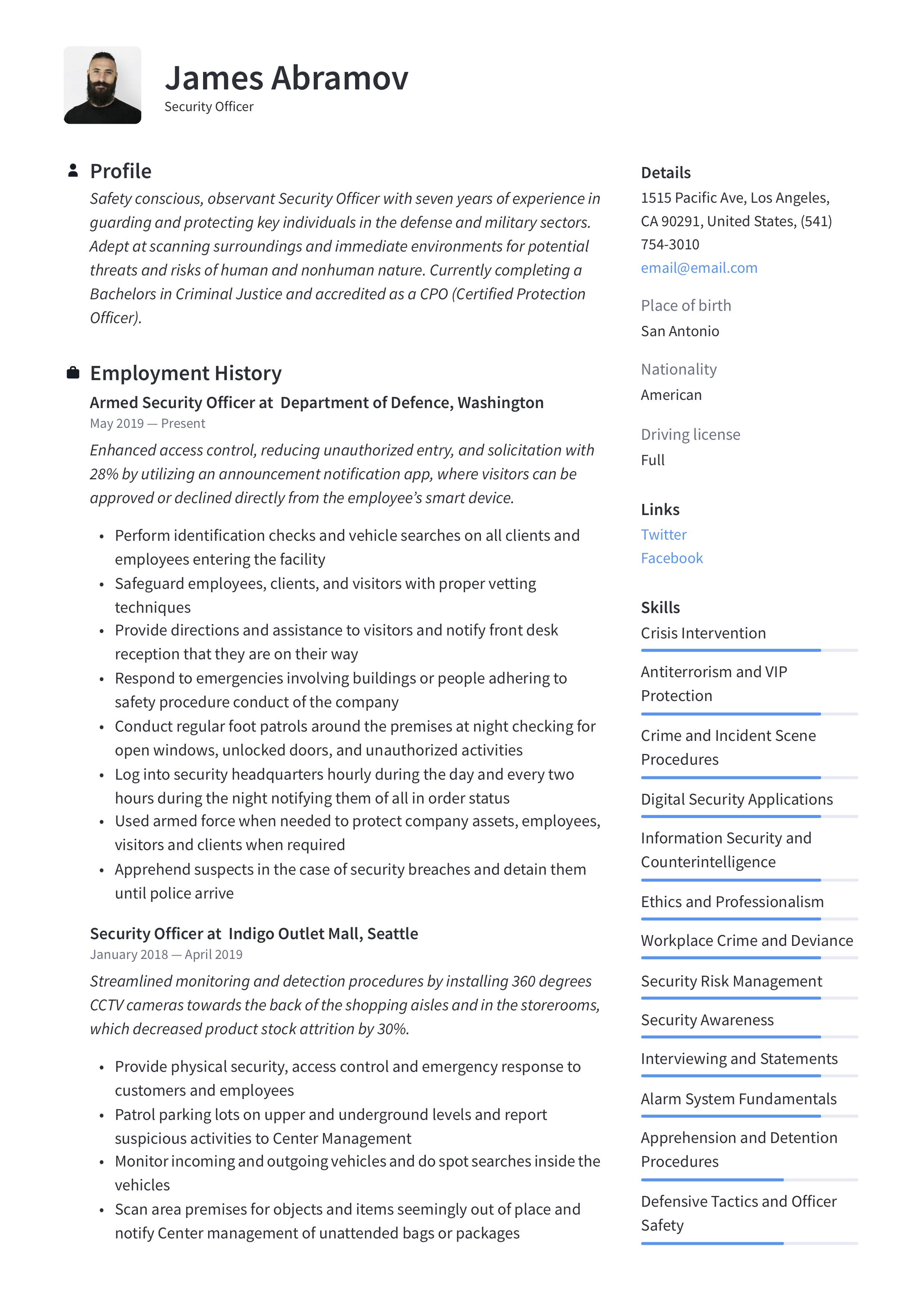
Security Officer – Resume (0).PDF
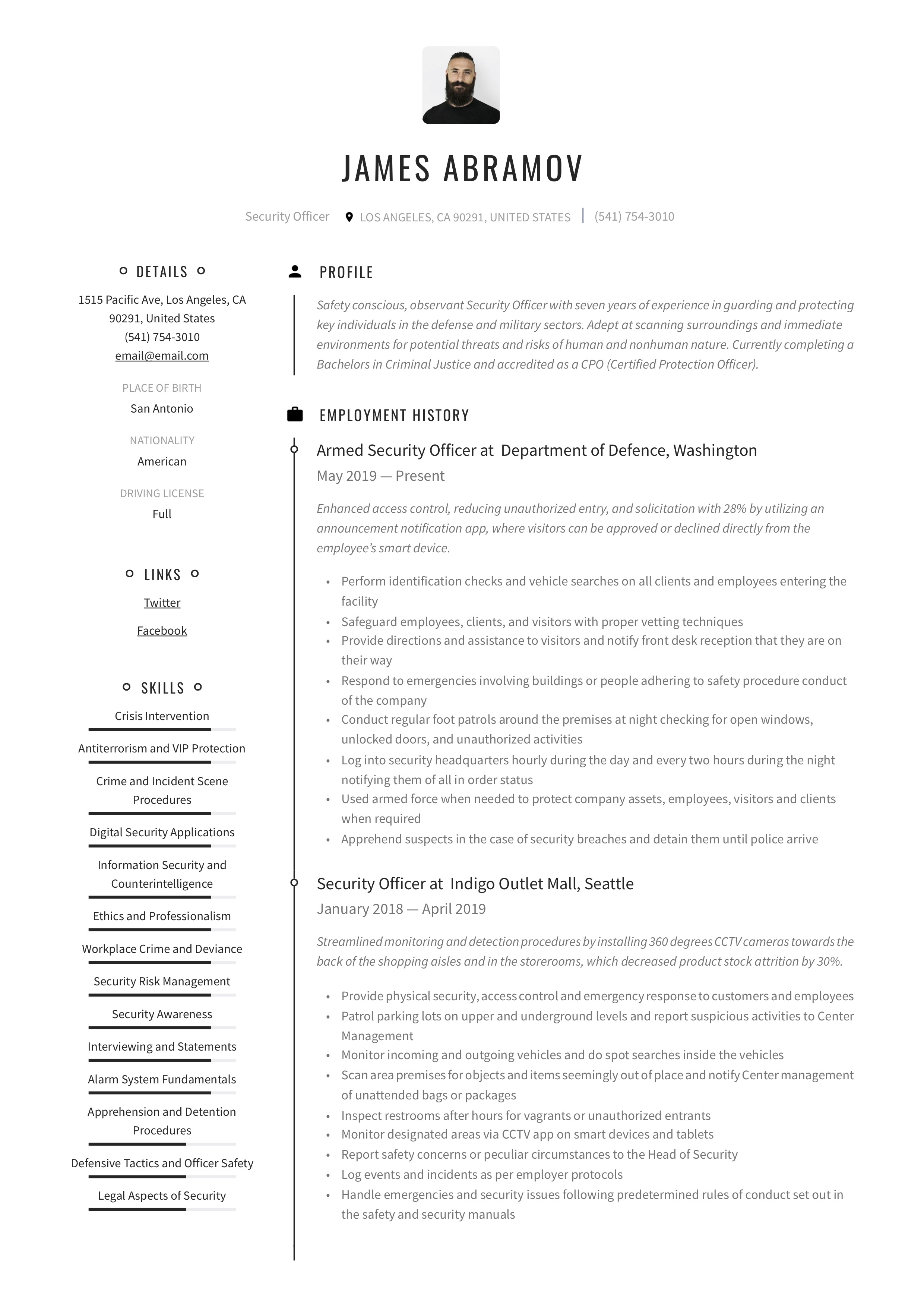
Security Officer – Resume (1).PDF
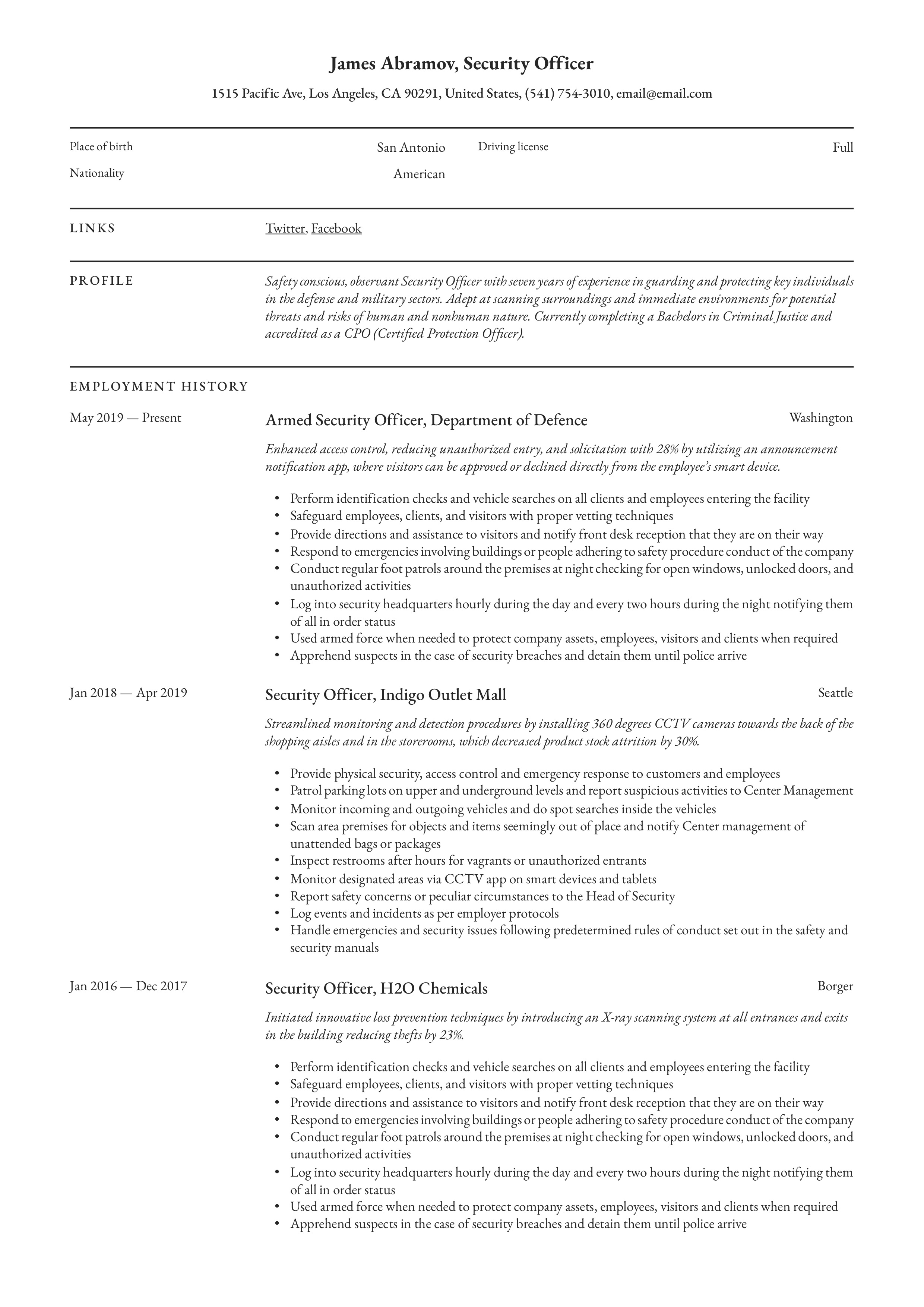
Security Officer – Resume (2).PDF
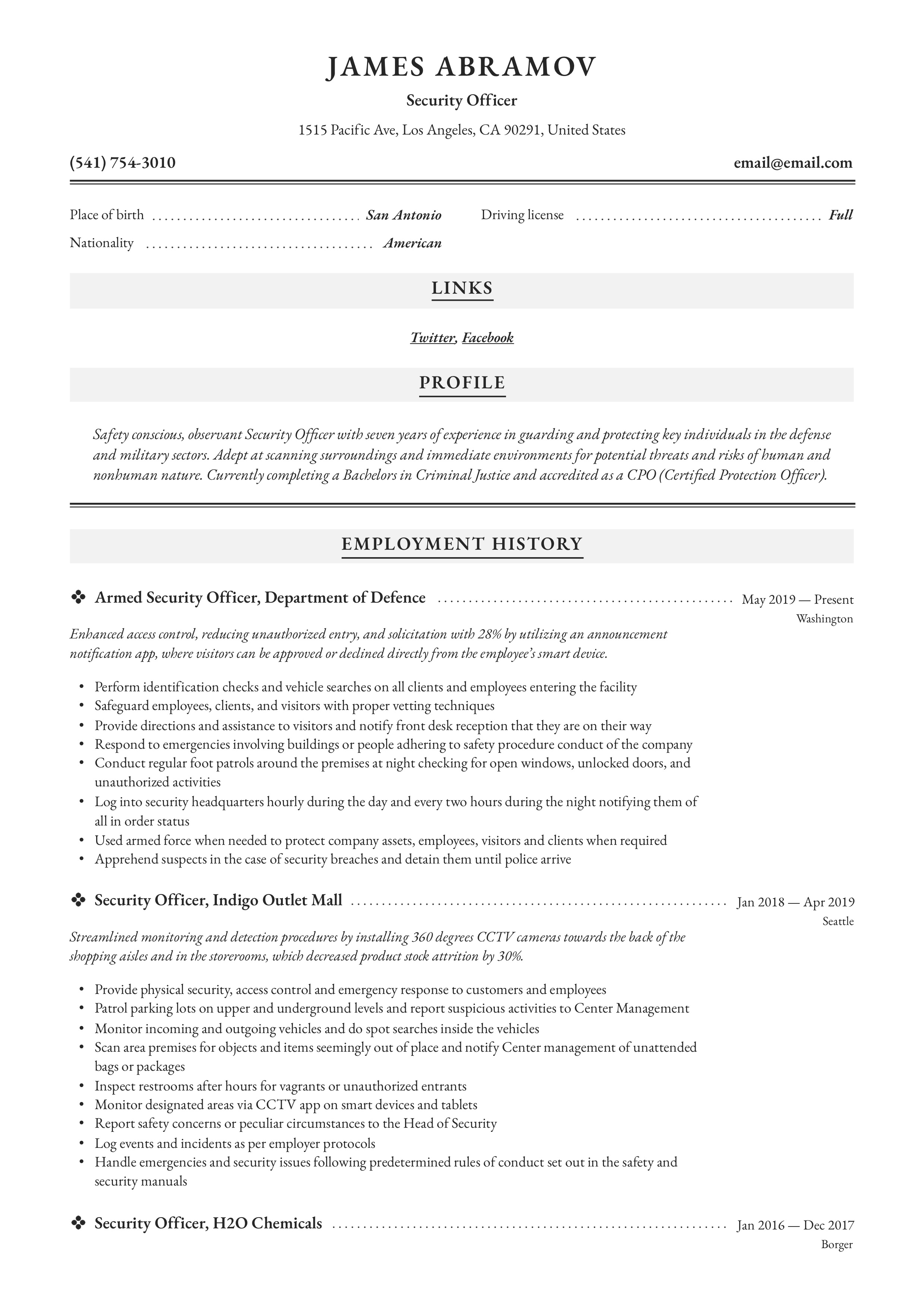
Security Officer – Resume (3).PDF
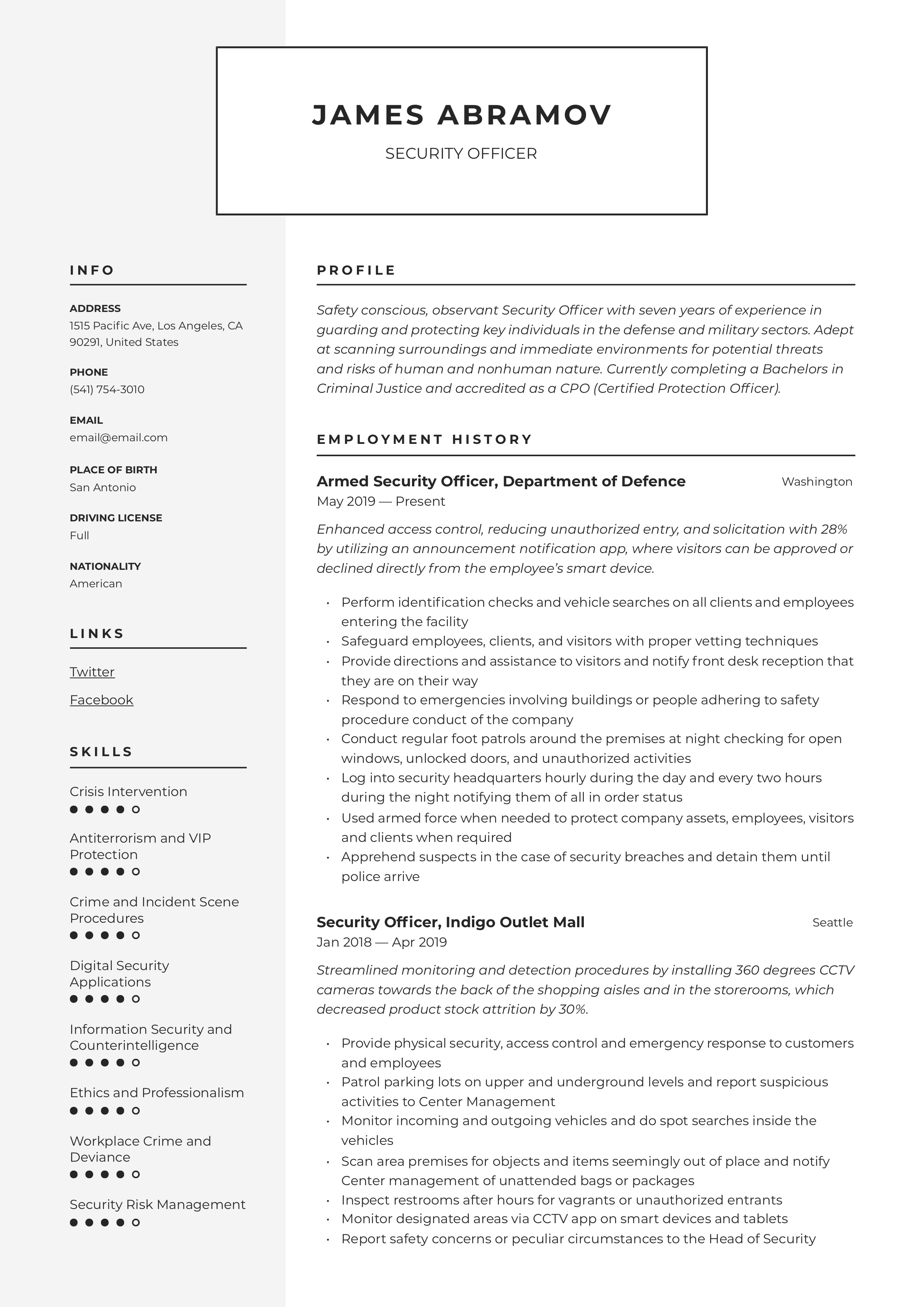
Security Officer – Resume (4).PDF
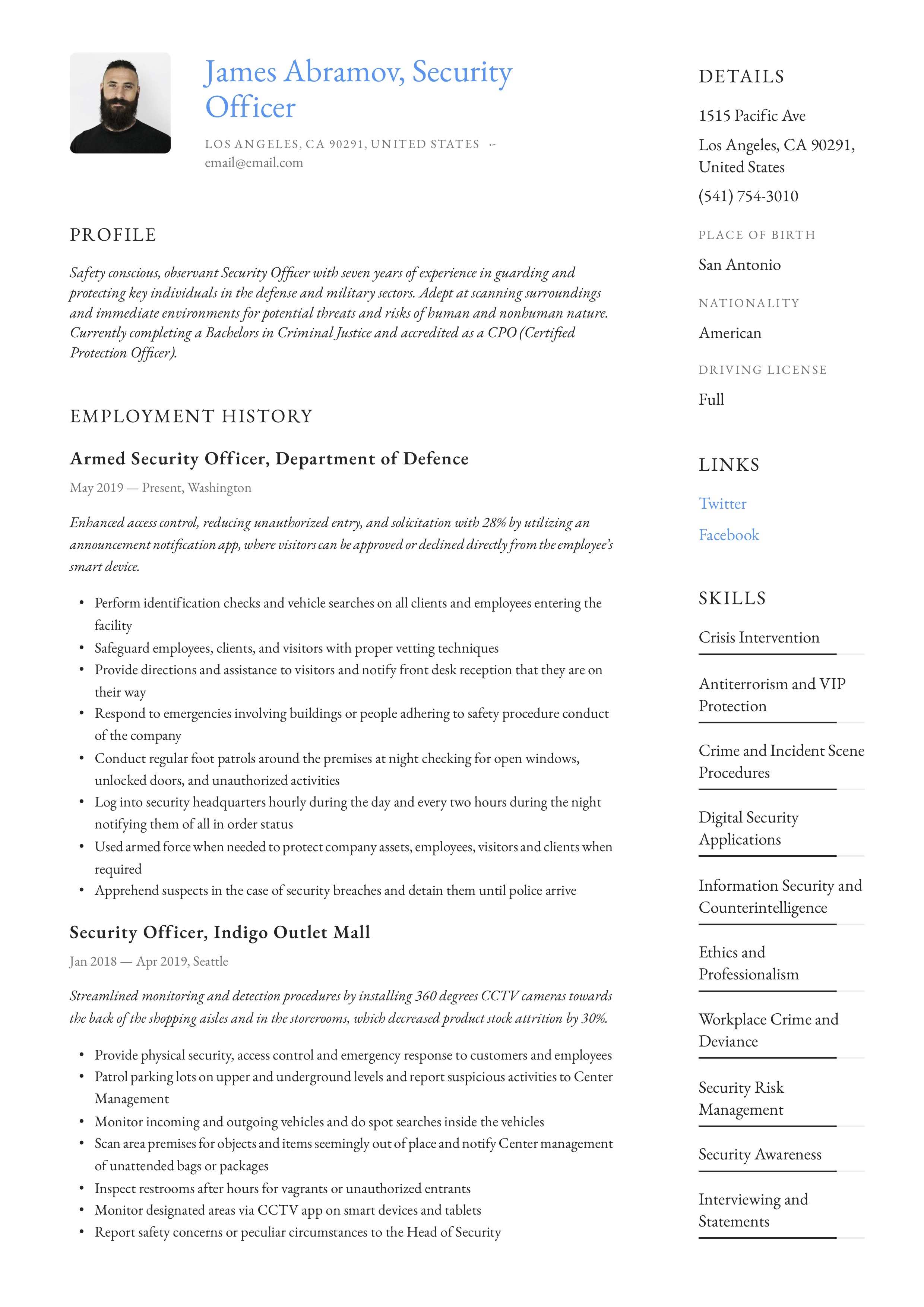
Security Officer – Resume (5).PDF
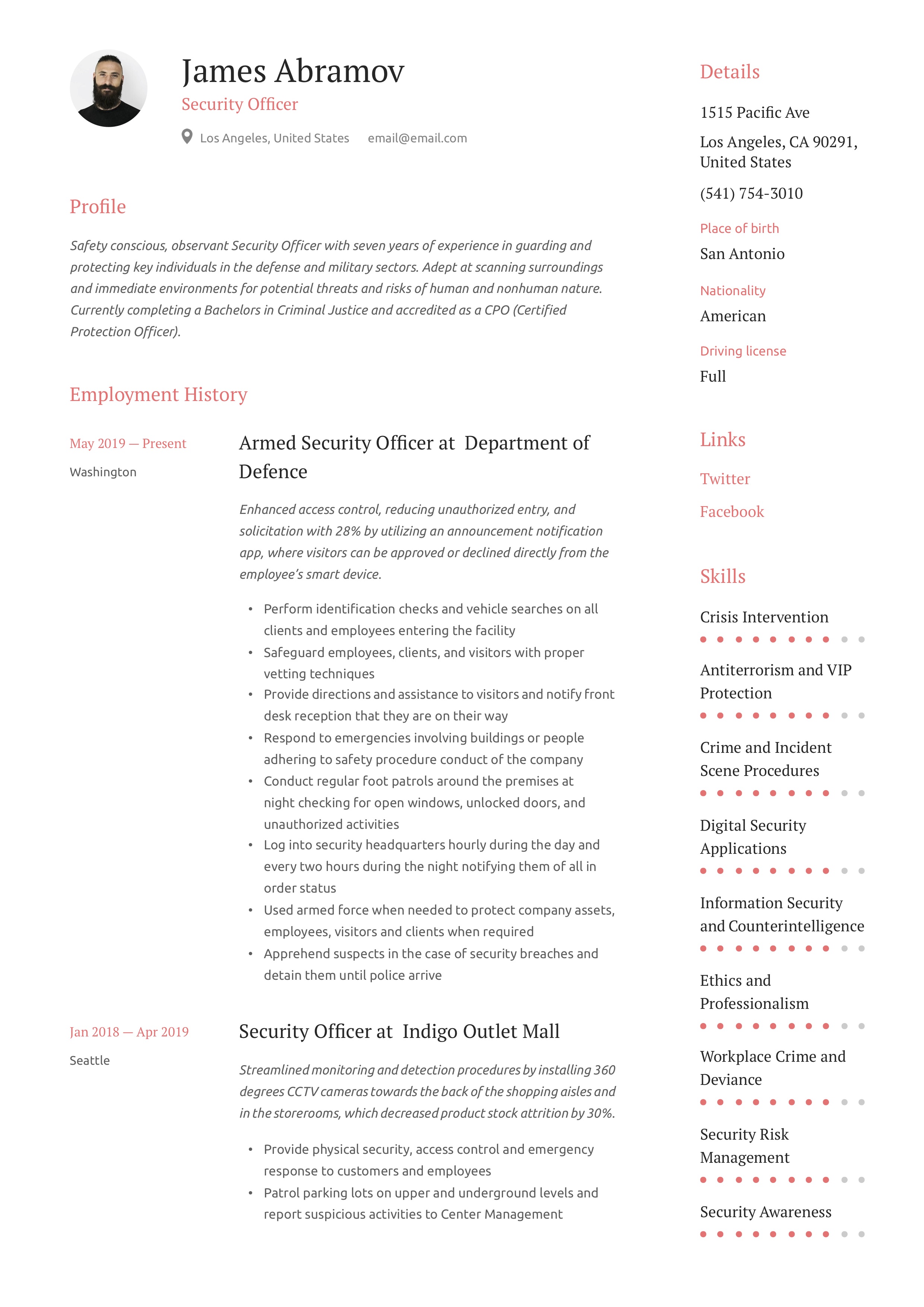
Security Officer – Resume (6).PDF
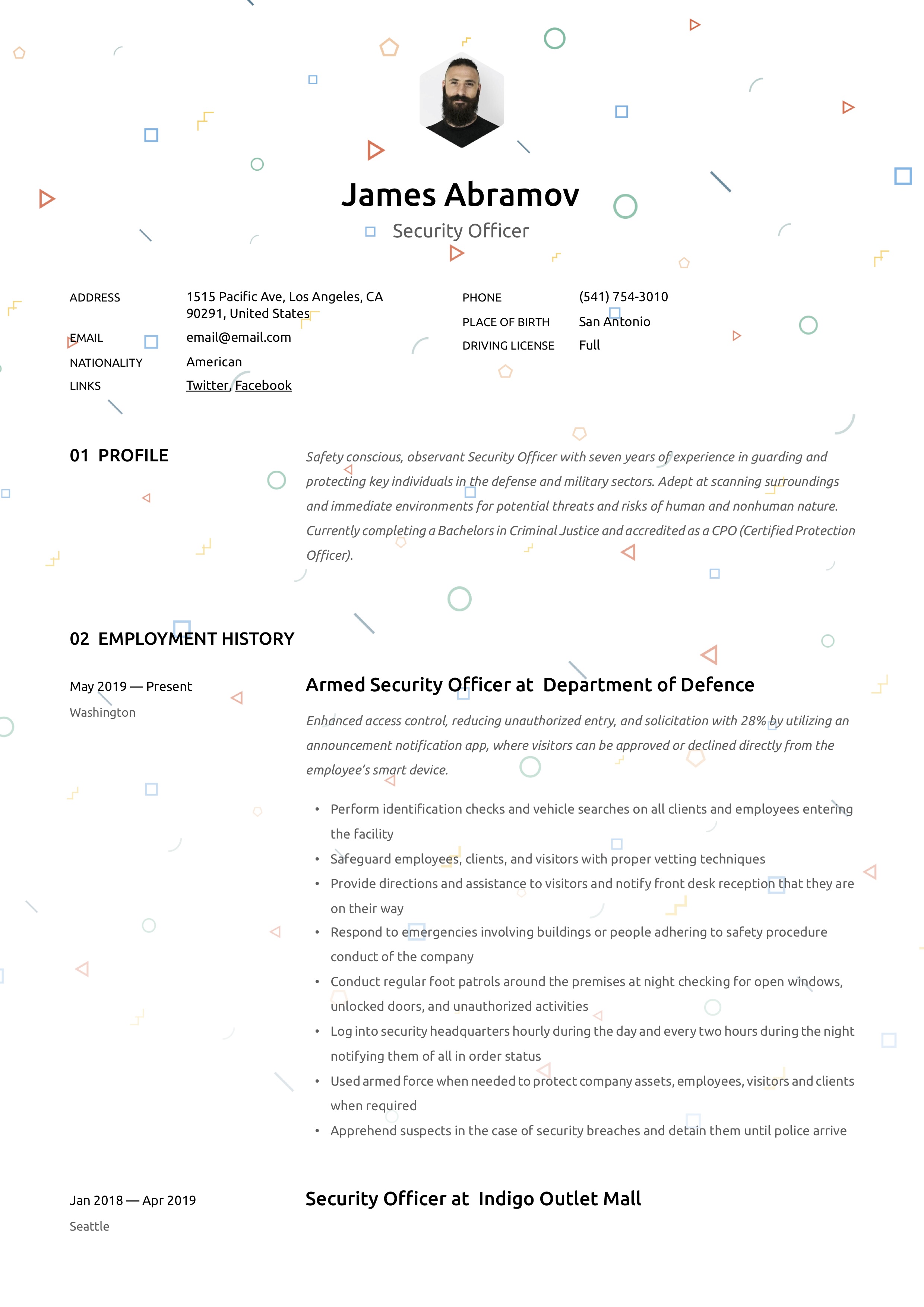
Security Guard – Resume (7).PDF
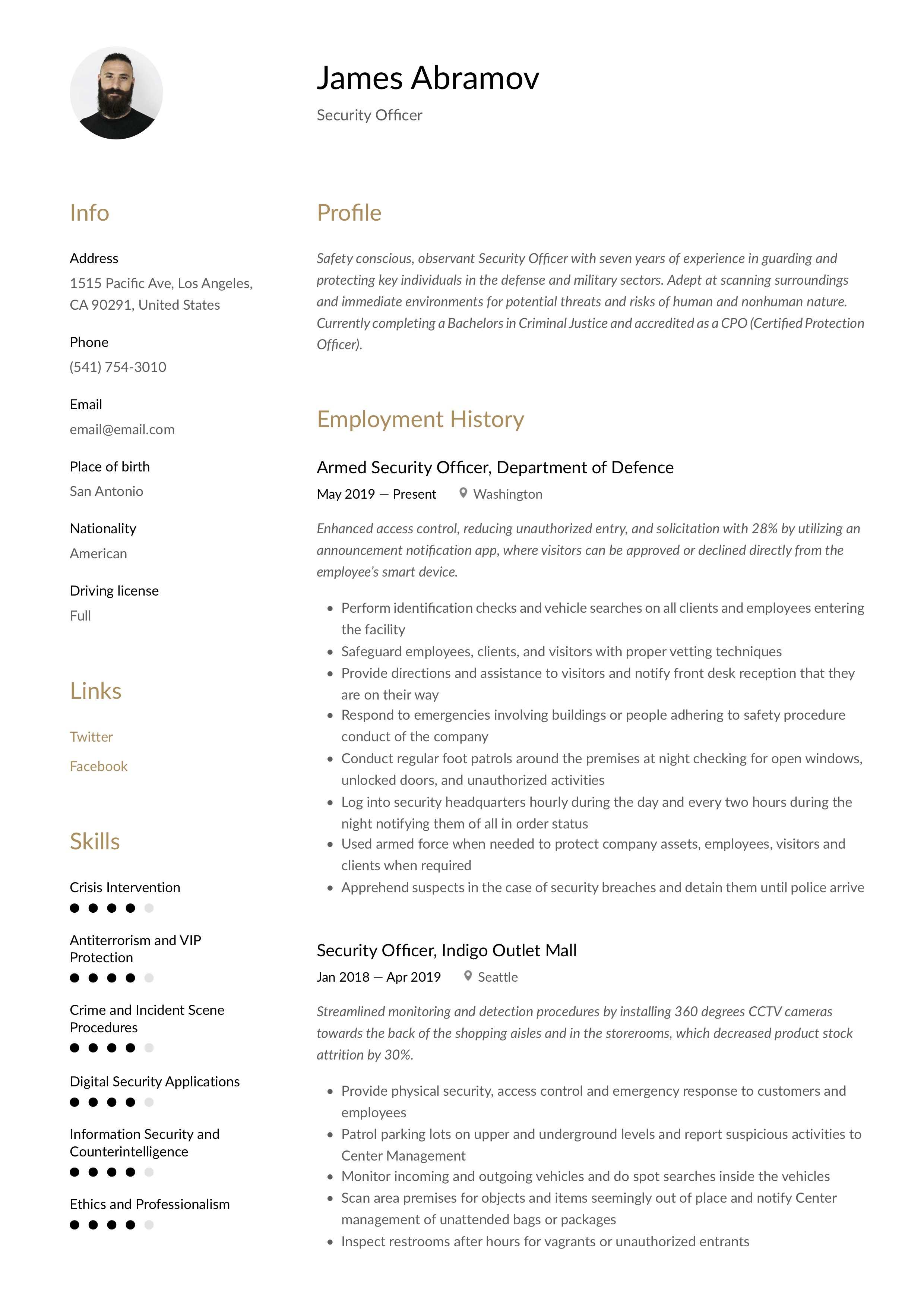
Security Officer – Resume (8).PDF
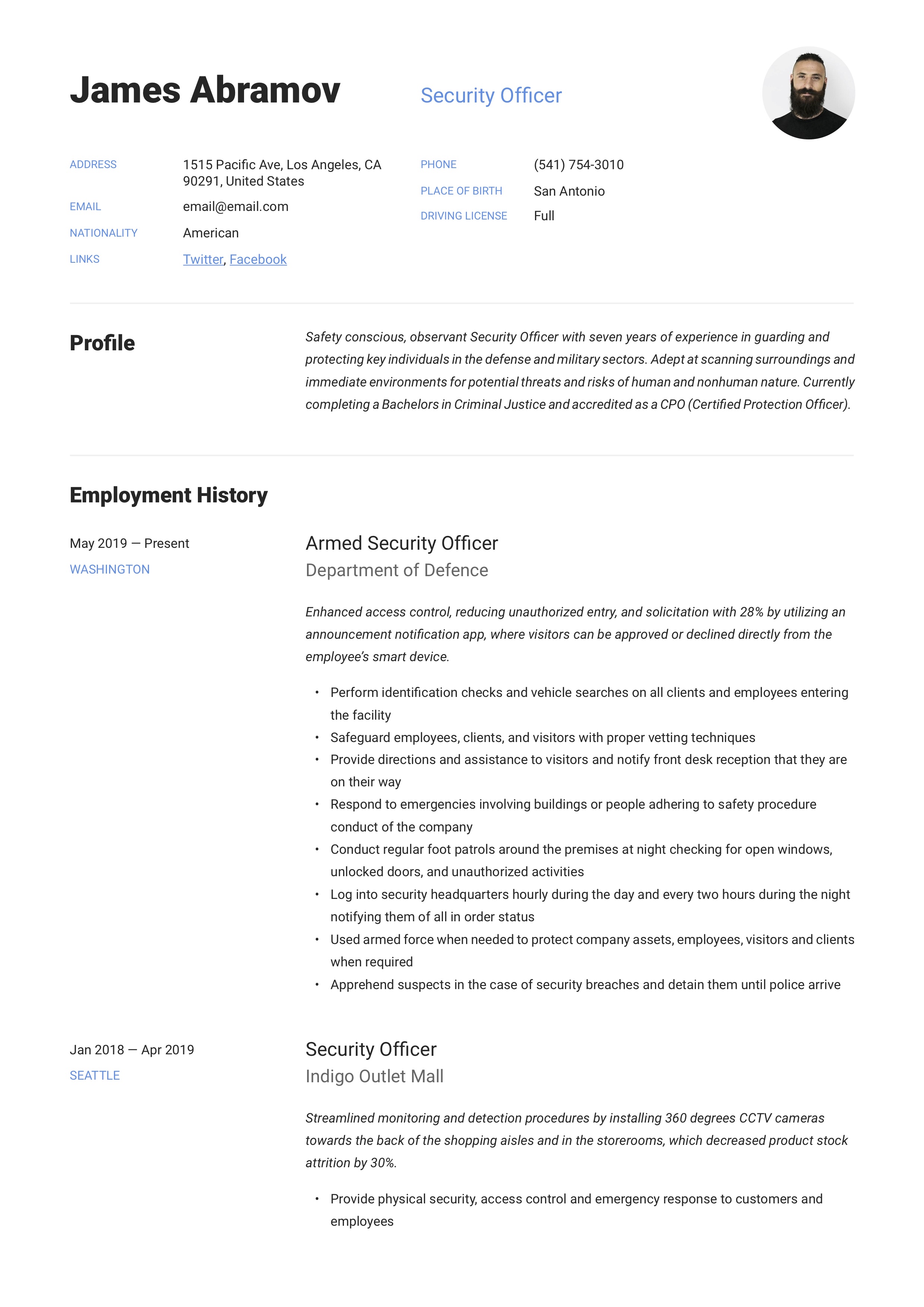
Security Officer – Resume (9).PDF
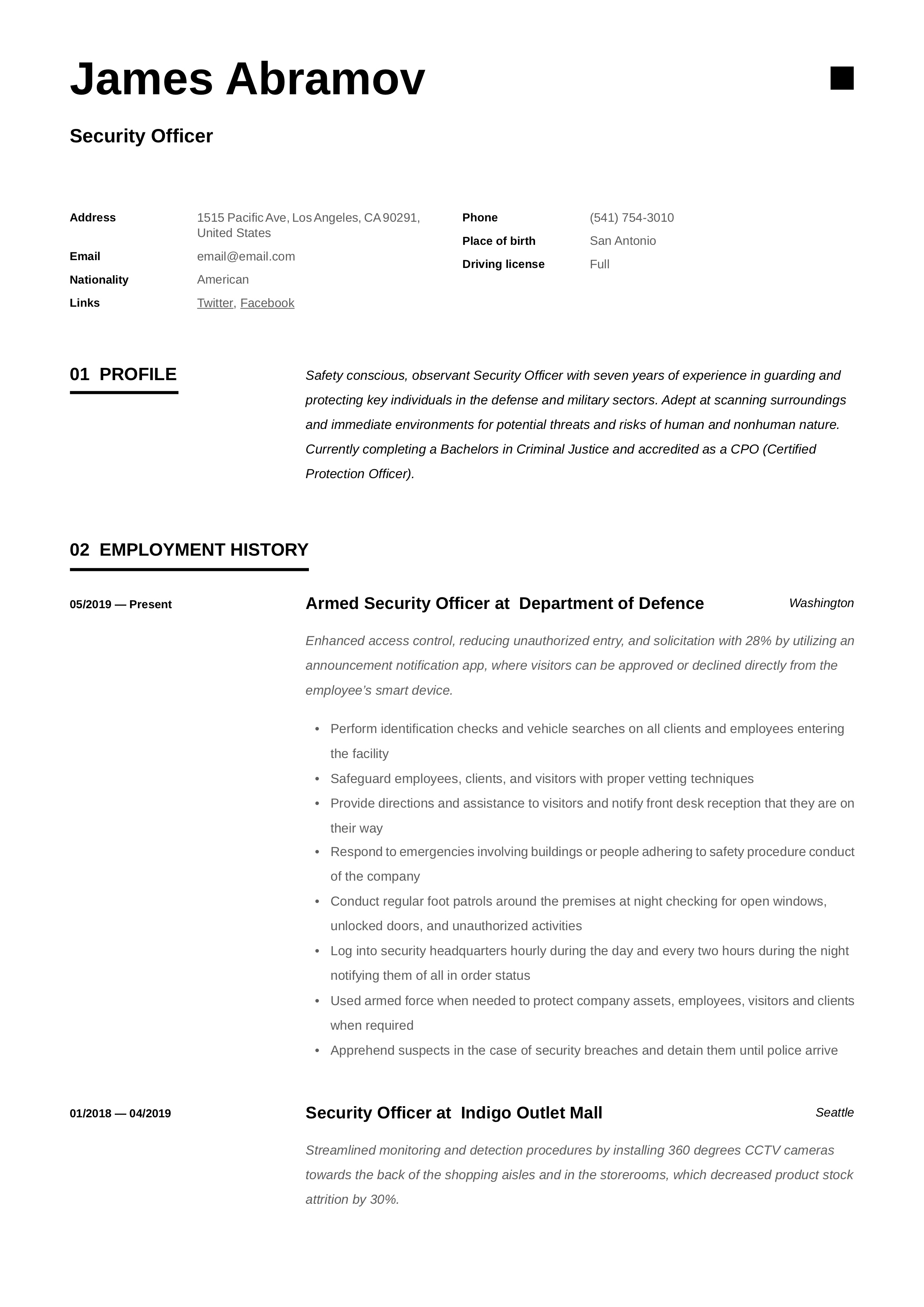
Security Guard – Resume (10).PDF
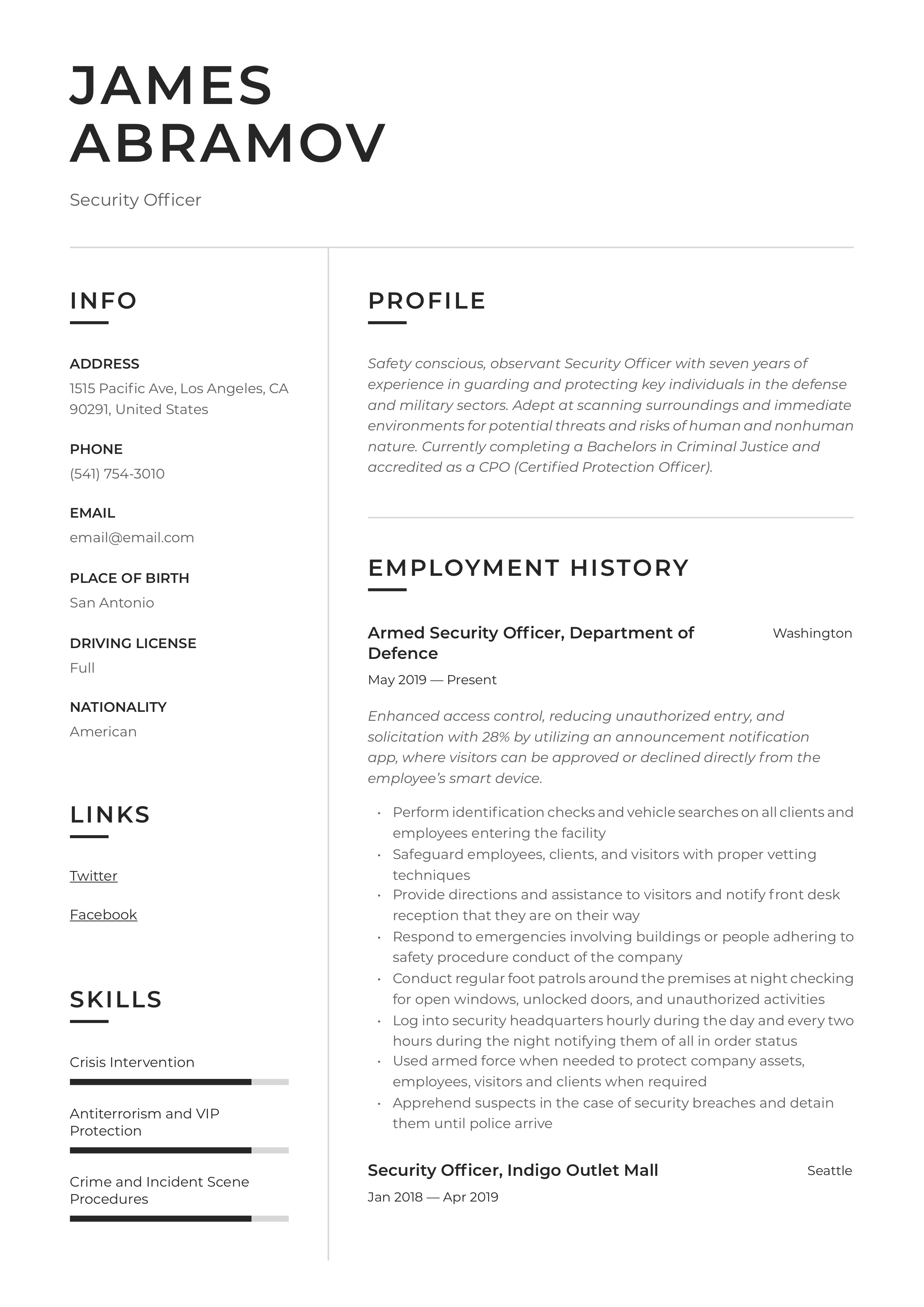
Security Guard – Resume (11).PDF
Professional Information for Security Officers
Sectors: Various
Career Type: Guarding, Protecting, Securing, Monitoring, Reacting, Preventing
Person type: Guard, Responder, Server, Guider, Officer
Education levels: High School Diploma to Post School Diplomas
Salary indication: $23K (low), $28K (medium), $37K (high), $78K (specialized) Glassdoor
Labor market: Estimated 6% growth between 2016 – 2026
Organizations: Hospitals, Correctional Institutions, Health Clubs, Schools, Office Parks Shopping Malls, Federal & Government Institutions, Hotels & Resorts, Industrial Facilities, Factories, Research Laboratories
